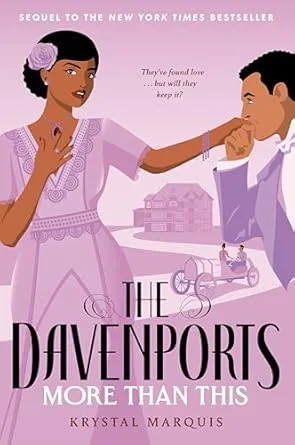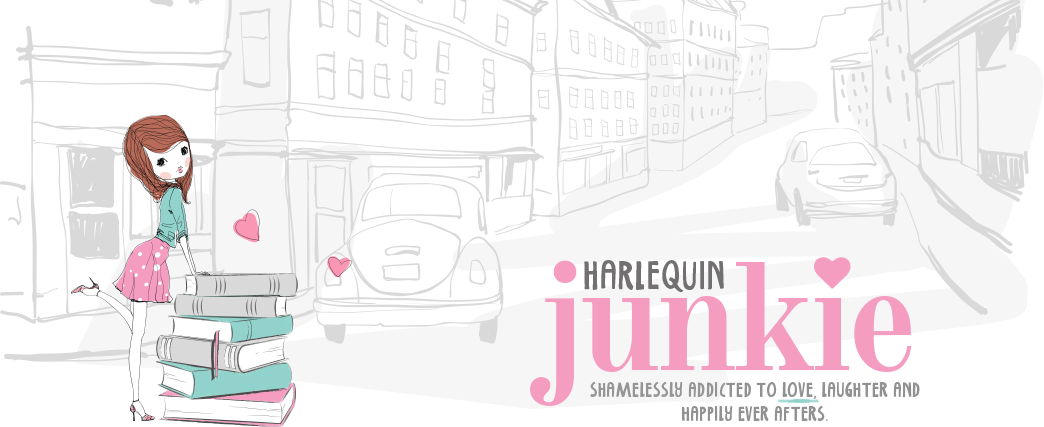Today, HJ is pleased to share with you Krystal Marquis’s new release: The Davenports: More Than This
The anticipated sequel to the instant New York Times bestseller featuring escapist romance and a wealthy Black family in 1910s Chicago

Newly engaged Ruby Tremaine is eagerly planning her wedding to the love of her life when a nasty rumor threatens her reputation and her marriage. Olivia Davenport has committed to the social justice cause and secretly hopes she’ll be reunited with dashing lawyer Washington DeWight—until her parents decide she’s to marry someone else. Amy-Rose Shepherd is making her lifelong wish of owning a salon come true, but when an incident forces her to return to Freeport Manor, she’s back in the path of John Davenport, who still holds her heart. Helen Davenport is determined to get over her own heartbreak and bring the Davenport Carriage Company into the new century, even if it means teaming up with a thrill-seeking racecar driver who just loves to get under her skin.
Inspired by the real-life story of the Patterson family, More Than This is the second book in critically adored Davenports series, following four empowered and passionate young Black women as they navigate a rapidly changing society and discover the courage to steer their own paths in life—and love.
“The Davenport universe has history, humor, and heart baked into it . . . Breezy and fluid prose supports the love-filled merry-go-round of will-they-won’t-they storylines.” —Kirkus
Enjoy an exclusive excerpt from The Davenports: More Than This
CHAPTER 10
oliviaThe porch swing squeaked as Olivia pushed it back. Her riding boots had fallen over where she’d kicked them off, her feet now tucked beneath her. The journal in which she’d been drafting her next speech remained on her lap, unopened and bookmarked with newspaper clippings, as she stared down the shady drive of Freeport Manor. Leaves rustled. The air was heavy with moisture, as if a terrible rainstorm made its way toward them and they just couldn’t see it for the blazing sun.
Olivia couldn’t be inside, though. Her mother, in her father’s absence these past two weeks, had turned the sitting room that joined Olivia’s and Helen’s bedrooms into the center of opera¬tions for Helen’s party. Swatches and floral arrangements, china samples, and everything in between were on full and excessive display. Her warnings against Olivia’s path to activism had been gentle, in contrast, but no less determined.
“I know you think this is the best way,” she’d said to Olivia that morning, “and I agree your perspective and passion are worthy
beyond a doubt. So, I will not stop you if this is the path you choose, but do not discount the value of our wealth and position.”
Wealth and position.
The exact reasons Olivia believed the meetings and marches were all the more important for her to attend. And also why she shied away from the stage. A weight had settled in her stomach as her mother had given her a look that was a mixture of pride and sadness.
Maybe it will be different for me? She recalled her mother’s rev¬elation weeks ago, of her and her father’s failed attempt, years ago, to bring about change through demonstration. Instead, they had chosen to live by example and occupy space among the elite, to raise their children as they had. Much to Helen’s chagrin.
Now Olivia found it difficult to do much more of anything than focus on the Cause. Ruby spent her time with her fiancé, Mr. Barton, and his friends and family. Helen, John, and Amy-Rose were consumed by business affairs in Chicago and New York.
And what do I do? she asked herself. With her afternoon free of engagements, Olivia had donned a divided skirt and her sturdy pair of riding boots and made her way to the stables. Chestnut, her docile mare, was the only companion that allowed her the freedom to voice her thoughts without inviting well-meaning advice. They’d roamed Freeport’s acres of land, milling around the groves of red maples and white oaks her mother had planted that reminded her of Boston Common. The early afternoon had felt somewhat cooler, but there was something in the air that in¬dicated the relief was temporary. Indeed, after returning Chest¬nut to her stall, feeding and brushing her down, Olivia had found herself sweating in the heat, still without inspiration, and not yet ready to return indoors.
“Miss Davenport?”
Olivia turned to see Mr. Stone step from the wide front door¬way onto the porch. He placed his straw hat on his head and ad¬justed his eyeglasses. Behind him she noticed Edward watching, the door partly ajar to show a sliver of the foyer and the butler inside.
“Thank you, Edward,” she said. He frowned but closed the door. “How can I help you, Mr. Stone?” She was tired and didn’t have the energy for pleasantries.
“I wanted to congratulate you on the other night.” He gestured questioningly to the seat beside her on the swing. She nodded, and he sat. “It takes a lot of courage to stand in front of a crowd and speak from your heart.”
Olivia groaned. Mr. Stone smiled at the sound—a rare expres¬sion, Olivia noted, that utterly changed his face. But her speech. It had been an abject disaster. She’d fumbled her words, dropped her cards, and lost the attention of the crowd in minutes. It was not at all the same as talking to a tearoom of ladies about Vivian Harsh’s appointment as a junior clerk at the Chicago Public Li¬brary and what that meant to women and Black people in the city. A quick look at Mr. Stone’s still smiling face made it clear he disagreed with her assessment.
He cleared his throat, smoothed his expression, and sat straighter on the porch swing, halting its rocking. “Your points were valid and, from what I heard, well-researched. It might just take practice. Or perhaps a speech is not the best avenue by which to share your thoughts. But they are worth sharing. My favorite part was when you said, ‘Hope visits us in many forms.’”
Olivia smiled. “My mother used to say that to us when we
were younger. She still does. It’s something her own mother used to tell her.”
“Very wise words.” He tapped the journal on her lap, his fin¬gertips grazing her leg. The featherlight touch made the hairs on Olivia’s arm stand on end. Mr. Stone drew back. “I apologize for overstepping.”
“You didn’t,” she said quickly, then broke eye contact. He looked at her with such intensity. “You know my parents mean for us to wed?” she asked.
“I know.”
“Each other,” she added, surprised by his calm.
“I know,” he said, with a rich laugh.
First the smile, now the laugh.
“Doesn’t it make you angry?” she asked. Or worse, maybe it made him pleased.
Mr. Stone laughed again. The sound eased some of her ten¬sion. It was a nice laugh. “No. They can want that for us. We can make our own assessment of how we feel. Then we can respect the other’s decision. It’s not that complicated.”
Olivia studied Mr. Stone. First the smile, then the laugh, now these words. He was right, of course. Her shoulders relaxed until they settled back against the seat.
“Though,” he said slowly, deliberately, “I can’t deny that I find you to be accomplished, witty, passionate, and beautiful. If this does not develop beyond friendship, I would still be so lucky.” Mr. Stone shifted his weight, and the swing began to move gently beneath them again. While he remained as affable as always, Ol¬ivia’s pulse raced, her mouth dry. He hummed. She gathered her scattered thoughts. Her lips parted, but something about the way he sat, enjoying the scene before them, gave her pause. He didn’t expect a response, nor need one. A gentle glance from him con¬firmed it.
They rocked in a companionable silence, watching the sun set over the tree-lined drive. It painted the sky gold, and silhouetted the starlings that soared toward the horizon and Lake Michigan beyond.
As the last of the sun’s rays fanned across the sky, Olivia dared to ask, “And what if you were more than lucky?”
Mr. Stone smiled again. Oh, did it make her chest tight! She didn’t want this feeling at all. “I would take you out on the town, dinner, dancing. I do hope you like talking. I’d like to know you, and for you to know me. Friendship first, friends always. Even if that’s as far as it goes.”
It was a relief. She and Mr. Stone could be friends, and she and Washington DeWight could be . . . whatever they were.
Olivia let her eyes fall to the journal in her lap. One of Wash¬ington’s letters was stuck between the pages. His response to her last note had been delayed, and shorter than usual, with this newspaper article folded into the envelope. Beneath it was her own copy of the Chicago Defender, and in her a strange restlessness she could not shake. Olivia ran her fingers over the frayed edges of Washington’s clipping and thought, as she often did, of their last dinner together. How he’d held her hand as they’d watched a sunset, much like this one, from the restaurant’s rooftop. He’d been elated at the prospect of traveling to the capital. With her. Together.
“You’ve come a long way,” he’d said. She remembered—his voice had held a twinge of surprise.
“Well, I’ve had an excellent teacher.” She’d watched him puff up beside her, and smiled. “Mrs. Woodard has quite the following here in Chicago,” she’d added, laughing.
He’d stopped and faced her. “Oh, Mrs. Woodard?” The expres¬sion in his honey-colored eyes had warmed her insides.
“Of course, you’ve been a great help as well,” she’d conceded. She laughed again and met him halfway when he leaned in to kiss her. The thought of his lips pressed against hers, the way his arms encircled her and pulled her close, it still made her pulse quicken.
“What are you most worried about?” Everett Stone asked, cut¬ting into her thoughts.
Olivia pulled herself back to the present. “I . . . have been work¬ing with the suffragists. They haven’t been able to find common ground with the union workers. One would think after the New York City garment strike and Clara Lemlich’s leadership, the im¬portance of working together would not be a hurdle. I just—I wish we could accomplish something of that magnitude.” Olivia paused and remembered how her throat had tightened when trying to address the large groups. She’d had years of practice and preparation watching her mother do the ladies’ lunches, and she had taken those reins with ease. “The problem is, I’m speaking from a place of privilege, attempting to ask women with far less to give more of their time, their livelihoods, even their safety. When I stand on that platform, the words just . . . leave me. Or my con¬viction does.” She sighed. She was ready to change the subject.
“The same could be said of me. Some people will always com¬pare their life to yours, exalt or hate you for it. It does not mean you should turn away from the good work that calls to you.” Mr. Stone leaned forward, elbows on his knees, and Olivia could no longer see his face. When he spoke again, his voice seemed strained. “I was raised by my uncle.”
Olivia mirrored his posture, sensing he was sharing some¬thing rare.
“My father was killed, when I was a boy. There was a robbery, and even though he was out of town when it happened, the shop¬keeper’s son identified him as the thief. That was all the proof required.” Everett Stone looked over his shoulder at her, the sun’s dying rays turning the glistening brown of his eyes a bril¬liant bronze. “There was no one to speak for him, to argue on his behalf. My uncle was younger than I am now when he took me in. My grandmother and grandfather had passed some years before.”
Olivia swallowed against the lump in her throat.
“It’s why I pursued a career in law.”
Olivia allowed herself a moment to imagine his pain, and placed her hand on his arm. The intricate musculature under her palm jumped at her touch. He squeezed her hand. “Hetty told me,” she said, her voice raspy, “about the work you do. The other work, beyond”—she gestured at her home, the grounds—“‘the Davenports’ of it all. “You help Black people in police custody make bail and defend themselves. You give those who have been arrested a voice.”
When he didn’t respond right away, Olivia looked back to the shady drive, the branches swaying in the slight breeze, the smell of heat rising from grass and soil. Her eyes roamed over it; she breathed it in—all her father had worked so hard to build for her mother, for her, and for her siblings. She suspected if Mr. Stone was out here with her, it meant John and Helen were in the garage working, exchanging notes, hatching some new plan.
At last he said, “There is more than one way to give people their voice, to provide a space to have it heard.” He pinched the top of the article Washington had sent and tugged. “Avid readers know this.”
Johnson Wins Fight the headline declared. She’d read the article several times already. The highly anticipated boxing match had taken place on July 4 between the “Galveston Giant” Jack John¬son, a Black boxer, and Jim Jeffries, his white opponent. Though in some places interracial boxing was banned, Reno, Nevada, hosted the “Fight of the Century.” Jackson, the son of two formerly en-slaved parents, had won, making him the first Black heavyweight champion of the world. Washington’s letter spoke of the riots that had erupted across the country as a result, the torches put to suc¬cessful Black communities, the unrest and protests against segre¬gation occurring across the Southern states. His sense of urgency heightened hers.
“Doesn’t it make you angry?” Olivia tugged the other clippings free. “Look, this man was hanged, another clubbed to death—”
“Yes, and life for men that look like me, like your brother, becomes all the more dangerous. The people who do this don’t care about wealth, status, or education. The only way things will change is if we change it.” He pressed his hand over hers. “Good evening, Miss Davenport.” He stood and walked down the steps toward the horse and Davenport buggy tethered near the stables.
“Mr. Stone?’ she called out. Her heart raced as he turned on the gravel drive.
“Yes, Miss Davenport?” He turned to show her his profile. His face angled down.
“Aren’t you going to ask about dinner? About that lucky day?”
He squared himself up to face her and removed his hat. “I make my own luck,” he said.
Olivia felt a smile spread across her face, felt the warmth of his gaze. Or maybe it was just the sunset blazing hot on her cheeks. Mr. Stone dipped his head then, and continued on his way. Olivia watched him climb in the buggy. The carriage bounced down the drive and disappeared between the trees, and his words replayed in her mind. Her attention returned to the article he’d tugged into view.
Now Olivia thought of Ida B. Wells and how her articles in the Memphis papers had traveled so far and wide. A woman, using her voice, to speak out about segregation and lynching, murder and violence. Her words, in print.
Olivia looked down the drive once more.
Later that night, she sat at her desk, a fresh page in her journal before her and pencil in hand.
There is more than one way.
The following morning, a card perched on the tray in the foyer:
Miss Olivia Davenport,
Would you do me the honor of accompanying me to dinner this Friday night?
In luck and friendship, Everett Stone, Esq.
Excerpt. ©Krystal Marquis. Posted by arrangement with the publisher. All rights reserved.
Giveaway: A print copy of The Davenports and The Davenports: More Than This
To enter Giveaway: Please complete the Rafflecopter form and post a comment to this Q: What did you think of the excerpt spotlighted here? Leave a comment with your thoughts on the book…
Meet the Author:
Krystal Marquis is the New York Times bestselling author of The Davenports, her debut novel. Krystal happily spends most of her time in libraries and used bookstores. She studied biology at Boston College and University of Connecticut and now works as an environmental, health, and safety manager for an online retailer. When not writing or planning trips to the Book Barn to discover her next favorite romance, Krystal enjoys hiking, expanding her shoe collection, and plotting ways to create her own Jurassic Park.
To buy: https://www.penguinrandomhouse.com/books/697073/the-davenports-more-than-this-by-krystal-marquis/


Diana Hardt
I liked the excerpt. It sounds like a really interesting book.
Mary Preston
I love the time period. Looking forward to reading more about Olivia.
debby236
Fantastic! Thanks so much
Daniel M
looks like a fun one
Dianne Casey
I really enjoyed the excerpt and I’m looking forward to reading the book. Adding to my TBR list.
Amy R
Sounds good
bn100
nice
Bonnie
Interesting excerpt. I’d love to read more.
Patricia B.
The excerpt reflects the society of the time and the position women, women of color, had in it. They were subject to the pressures and expectations of women and women of wealthy families of the town.
Laurie Goudge
looks like an interesting read